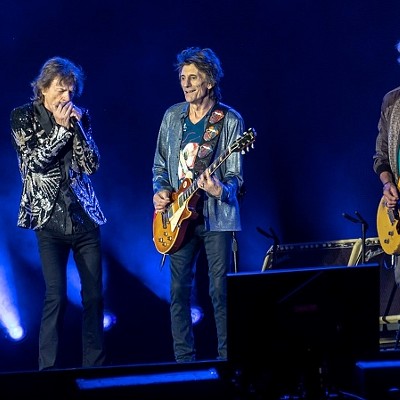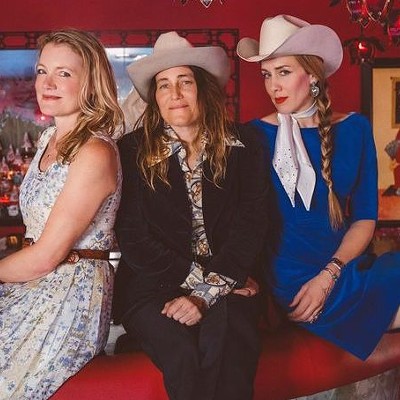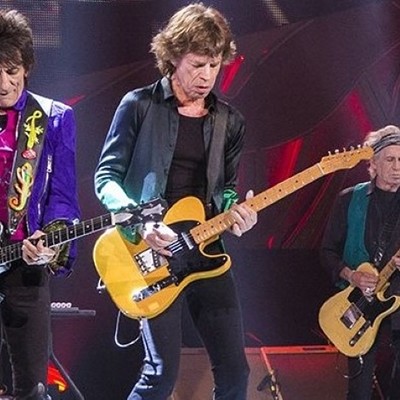The summer concert calendar for 2016 is a facsimile of a different time. Indeed, it's a facsimile of a time when we actually knew and used the word facsimile. If we dug through the Houston Press archives from the 1990s, tucked between the yellowed Zima advertisements and winning Rockets scores, we might find a lineup similar to that of the next few months: Smashing Pumpkins. The Cure. Salt-N-Pepa.
That's right, Houston. This is the summer of the nostalgia tour.
The nostalgia tour has a simple and powerful anatomy. Take a few bands whose music is sealed in the amber of a vaguely memorable decade. Dig up a handful of earworm hits that we still, for some reason, know all of the words to. Stitch in a few charming, dated technological references and cheesy catchphrases and then shock the whole lot with a bolt of sentimental electricity. The nostalgia tour — it's alive!
But be sure to check the balance on your credit card; you might have to shell out upwards of $1,000 on tickets to one of these shows.
Most people warp nostalgia's meaning, misconstruing it to be a mere sentimentality for the past. Under this definition, the nostalgia tour is just a formalized excuse to sing "Bullet With Butterfly Wings" at the top of your lungs while wearing butterfly clips in your hair. But its roots, the Greek "nóst," meaning "return home," and "algia," meaning pain, suggest that the draw of nostalgia comes from trying to revisit a home you can't quite return to, and trying to seize a moment that you can't quite get back.
Musically, the '90s are that home we can't return to. Smashing Pumpkins harken back to a time when the label "alternative" still had a cache of meaning and the radio played music with grit. Salt-N-Pepa are a lighthearted, sexy antidote to the gritty realities of rap music now informed by the Black Lives Matter movement. The Cure left such an indelible mark on this city that the Numbers documentary is named after one of their songs. Nostalgia tours aren't just a way for those creeping towards forty and beyond to revisit their fleeting youth for an evening. They're a desperate attempt for young and old alike to fend off the sense of homelessness that comes from an increasingly unstable world.
Think about it. In 2016, Bill Cosby is an alleged serial rapist, not a beloved, besweatered father to the nation. Listening live to the sultry groove of "Whatta Man" is a way for us to temporarily forget his moral turpitude and embrace the Huxtable myth. In 2016, the price of oil has dipped precariously close to $30 a barrel and for sale signs pop up in front of houses like genital warts: unwanted, and unavoidable. Of course we spend obscene sums on '90s reunion tours; they briefly let us indulge in the fantasy that our local economy isn't an offshore rig just waiting to explode.
Artists, for their part, are generally content to pander to the fantasy, playing a comforting selection of old hits to keep the lie alive (case in point: when They Might Be Giants came into town on April 1, they dedicated an entire set to their 1990 album Flood). Some don't even bother with the pretenses of an album; Salt-N-Pepa's last one was released in 1997 and received tepid reviews and circulation. Those who dare unfreeze themselves from their moment in time risk literal evisceration by pitchforks; Violent Femmes's new album — their first in 16 years — was recently panned as "a pale Silly Putty copy of their still-beloved self-titled record." New music dismantles the fiction that time has not marched on; of course the reaction is righteous indignation.
But march on it has, and bands, like it or not, have marched on with it. Smashing Pumpkins no longer play grimy, sold-out shows at The Vatican because they can't — it's been closed since 1993. Even if they could, trying to recapture that moment too perfectly would send us into an uncomfortable uncanny valley. We might not feel so alive and liberated in that rugged, underground punk venue. The sound might be too blistering, too loud. Our backs might start to hurt. We might feel old. As an audience, we will have to try our best to salve ourselves with the facsimile, the ready-made version of the past that we are ready to consume, and hope that will suffice.
Support Us
Houston's independent source of
local news and culture
account
- Welcome,
Insider - Login
- My Account
- My Newsletters
- Contribute
- Contact Us
- Sign out
[
{
"name": "Related Stories / Support Us Combo",
"component": "11591218",
"insertPoint": "4",
"requiredCountToDisplay": "4"
},{
"name": "Air - Billboard - Inline Content",
"component": "11591214",
"insertPoint": "2/3",
"requiredCountToDisplay": "7"
},{
"name": "R1 - Beta - Mobile Only",
"component": "12287027",
"insertPoint": "8",
"requiredCountToDisplay": "8"
},{
"name": "Air - MediumRectangle - Inline Content - Mobile Display Size 2",
"component": "11591215",
"insertPoint": "12",
"requiredCountToDisplay": "12"
},{
"name": "Air - MediumRectangle - Inline Content - Mobile Display Size 2",
"component": "11591215",
"insertPoint": "4th",
"startingPoint": "16",
"requiredCountToDisplay": "12"
}
,{
"name": "RevContent - In Article",
"component": "12527128",
"insertPoint": "3/5",
"requiredCountToDisplay": "5"
}
]
KEEP THE HOUSTON PRESS FREE...
Since we started the Houston Press, it has been defined as the free, independent voice of Houston, and we'd like to keep it that way. With local media under siege, it's more important than ever for us to rally support behind funding our local journalism. You can help by participating in our "I Support" program, allowing us to keep offering readers access to our incisive coverage of local news, food and culture with no paywalls.
Trending Music
- Houston Concert Watch 4/24: Rolling Stones, Bad Bunny and More
- How Much Longer Can Classic Rock Rule the Roost?
- Swans' Sonic Assault Levels White Oak Music Hall (Metaphorically)
-
Sponsored Content From: [%sponsoredBy%]
[%title%]

Don't Miss Out
SIGN UP for the latest
Music
news, free stuff and more!
Become a member to support the independent voice of Houston
and help keep the future of the Houston Press FREE
Use of this website constitutes acceptance of our
terms of use,
our cookies policy, and our
privacy policy
The Houston Press may earn a portion of sales from products & services purchased through links on our site from our
affiliate partners.
©2024
Houston Press, LP. All rights reserved.




